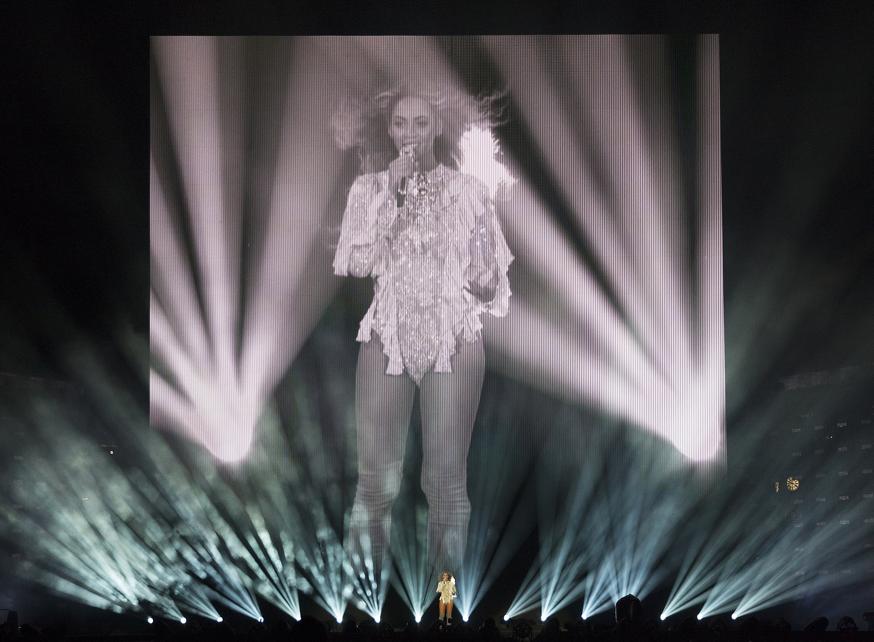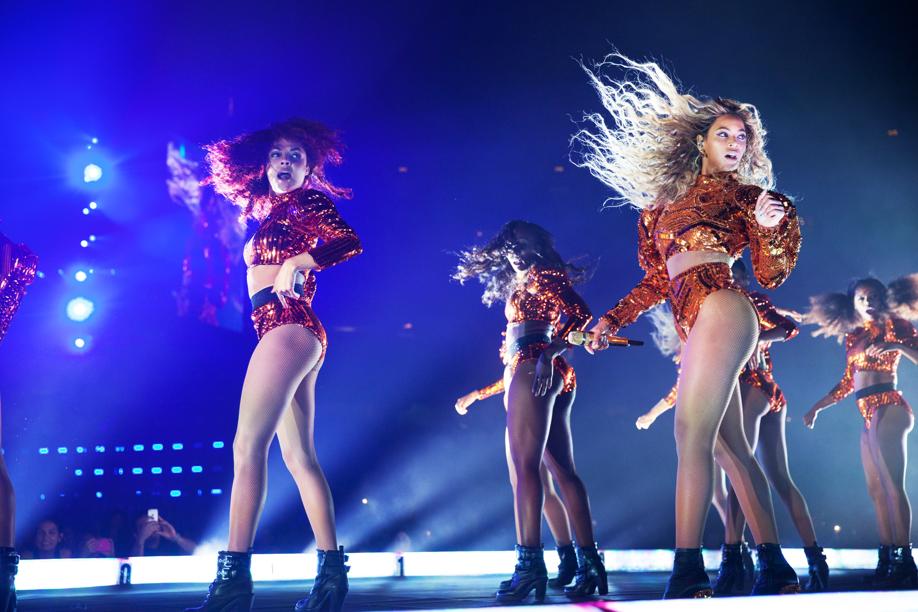Beyoncé
At Gillette Stadium, Foxborough, June 3 at 7:30 p.m. Tickets: $50-$310.
800-745-3000, www.ticketmaster.com
Scanning Twitter while watching television seldom seems like a good idea. How much quality attention are you paying, really, if you’re also trying to keep pace with your timeline — or stay one step ahead of it, trying to formulate the ideal 140 characters to get noticed, liked, retweeted? Still, for every rule there’s an exception. Mine was called “Lemonade.’’
If you glanced at social media between 9 and 10 p.m. hereabouts on Saturday, April 23, you almost certainly had a timeline full of “Lemonade,’’ the new hourlong “visual album’’ from Beyoncé, who performs on Friday night at Gillette Stadium. “Lemonade’’ had its world premiere on HBO that evening. Watching the responses play out was fascinating; drowning out any predictable point-by-point analysis of the music and images, at least among folks I follow, was an almost voyeuristic speculation as to whether the indomitable Ms. Knowles was serving Jay Z, her allegedly wayward husband, with divorce papers on prime-time pay TV.
It was funny at first, and then it just seemed silly. Did anyone really think that an artist and celebrity as consistently shrewd as Beyoncé would stoop to such reality-TV tactics? Did anything about that idea connect meaningfully to the tightly controlled public image and zealously guarded privacy to which we’d grown accustomed?
Confession time: I spend few waking moments contemplating Beyoncé’s personal life. My admiration for her work, though enduring and deep, doesn’t extend to that possessive sense of part-ownership that pervades our society’s relationship with its celebrities. My sole contribution to the evening’s tweetstorm came during the album’s trenchant turning point, “Sandcastles,’’ when Jay Z joined his wife onscreen for what looked like a fragile but firm reconciliation as she sang:
And I know I promised that I couldn’t stay, baby
Every promise don’t work out that way
“Million jaws dropped just now,’’ I tweeted superciliously.
There was a lot more to say about “Lemonade.’’ But my own response was simply to re-up my lapsed trial subscription to Tidal, the Jay Z-owned music and video streaming service that had what turned out to be a 24-hour lock on Beyoncé’s new offering. (Was a rising Tidal the point of “Lemonade’’? Cynics suggested as much.)
Before long, a number of voices suggested middle-aged white male perspectives weren’t necessary to measure a black woman’s experience — and phenomenal achievement. “Dear White People Who Write Things: Here’s How to Write About Beyoncé’s Lemonade,’’ ran the headline on one well-circulated webzine post, followed with an initial directive: “Don’t.’’ So instead, I read; I saw transgender activist Janet Mock spar with feminist scholar bell hooks. I mulled an essay that conjoined “Becky with the good hair’’ to 18th-century slave tradition.
I agreed that more black perspectives, more women’s perspectives, and especially more black women’s perspectives were vitally needed.
The thing is, though, you can’t choose to ignore what almost certainly will prove the best album of the year, and the best album — the best thing — a star the magnitude of Beyoncé has ever made, one that already has shaken the music and entertainment businesses so soundly.
I haven’t stopped listening to “Lemonade.’’ And I’ve come to believe Beyoncé’s operating on the next level above the next level, and that I shouldn’t have recused myself.
There’s been much speculation about Jay Z’s infidelity, fueled in part by the 2014 elevator-cam footage of Beyoncé’s sister Solange Knowles laying into him. And with “Lemonade,’’ an Internet witch hunt turned up fashion designer Rachel Roy as a possible real-life counterpart to “Becky’’ and ruined TV food personality Rachael Ray’s day in the process.
It’s impossible to avoid thinking that “Lemonade’’ draws on Beyoncé’s feelings about personal betrayal. The anger, pain, and conflicted acceptance in the richest, most varied, and most nuanced performance she’s delivered so far are too authentic (yup) for method acting.
In that way, the album joins a rich body of work illuminating the dark nights and days of the soul that accompany failed relationships: Frank Sinatra’s “In the Wee Small Hours,’’ Fleetwood Mac’s “Rumours,’’ Richard and Linda Thompson’s “Shoot Out the Lights,’’ and, as my colleague Ty Burr cited, Marvin Gaye’s “Here, My Dear.’’
Beyoncé also sings of the father who made her strong and tough, who charged her with protecting her mother and sister, yet who was himself a cheater. In her own expression of acceptance in “Sandcastles,’’ she acknowledges that she couldn’t live up to a promise she’d made to herself.
It feels meaningful that the homily providing the album’s title is spoken by Jay Z’s grandmother Hattie White, recorded during her 90th birthday party in April 2015: “I had my ups and downs, but I always found the inner strength to pull myself up. I was served lemons, but I made lemonade.’’ And in the end, in the fierce strut of “Formation,’’ Beyoncé recognizes she’s got the upper hand. “I might get your song played on the radio station, cause I slay,’’ she boasts. Maybe she could have added, “I might get your streaming service another 1.2?million subscribers.’’
But to reduce “Lemonade’’ to reportage, to one ultra-powerful woman’s airing of her husband’s dirty jockeys, is to diminish its scope, its imagination, its capacity to connect, to share, to aid in healing the hearts of others who’ve faced personal crises. The album’s dense aural textures — from loose-limbed Southern swing to ponderous rock riffage, trap, gospel, and onward — allude to frames of reference broader than Beyoncé’s life and experience.
It’s a work of genius, plain and simple.
Blowhards flocked to Twitter to claim otherwise, citing the 72 writing collaborators credited on the album. (Lost on them, evidently, was that she credited some writers whose work was merely sampled — proof that Beyoncé not only spreads a big tent, but also sees the wisdom of tracking royalties.) That such objections aren’t leveled at Martin Scorsese for not starring in his own films, or at Bill Belichick for not scoring his own touchdowns, is evidence of a continued view of musical authenticity as the sole purview of those with calloused hands and sweating brows. It’s outdated, outmoded. The creative village doesn’t prop up Beyoncé; she assembles and occupies the village, shaping its collective labors to her vision.
The film, like the album designed and executed by multiple creators, reinforces that singular vision, attaching her personal story in powerful and meaningful ways to a broader, richer history through its dreamy, eerie, and gritty images of militants and victims, inflamed lovers and bereaved mothers, Madewood Plantation House and the Superdome.
That Beyoncé could pull off so magnificent an undertaking with so many people involved and avoid media leaks completely? That would defy belief, were we talking about anyone but Beyoncé, who beyond her skill and appeal as a performing artist has proved, time and again, one of the most virtuosic executives in the entertainment industry. You get the sense that from her buzzed-about Super Bowl performance, in which “Formation’’ debuted complete with its controversial paramilitary couture and choreography, through the mysterious teases that led to the HBO broadcast, everything had transpired precisely according to Beyoncé’s plan.
“Lemonade’’ the film may have been the delivery system that brought Beyoncé’s latest creation into our homes, our Twitter feeds, and our day-to-day arguments, but “Lemonade’’ the album is the project’s heart, soul, and testament. How much of its depth and breadth will translate to the stage at Gillette Stadium on Friday night is one more test of a regal artist’s determination and control.
Beyoncé
At Gillette Stadium, Foxborough, June 3 at 7:30 p.m. Tickets: $50-$310. 800-745-3000, www.ticketmaster.com
By Steve Smith | Globe Staff
Steve Smith can be reached at steven.smith@globe.com. Follow him on Twitter @nightafternight.




 PREVIOUS ARTICLE
PREVIOUS ARTICLE